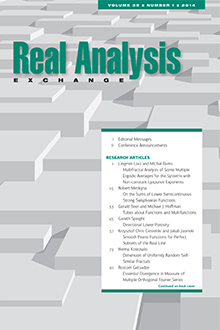Abstract
For a family \(\{k_\alpha \,\vert \,\alpha \in I\}\) of real \(\mathcal{C}^2\) functions defined on \(U\) (\(I\), \(U\) — open intervals) and satisfying some mild regularity conditions, we prove that the mapping \(I \ni \alpha \mapsto k_\alpha^{-1}\bigl(\sum_{i=1}^n w_i k_\alpha(a_i)\bigr)\) is a continuous bijection between \(I\) and \((\min\underline{a}, \,\max\underline{a})\), for every fixed non-constant sequence \(\underline{a} = \bigl(a_i\bigr)_{i=1}^n\) with values in \(U\) and every set, of the same cardinality, of positive weights \(\underline{w} = \bigl(w_i\bigr)_{i=1}^n\). In such a situation one says that the family of functions \(\{k_\alpha\}\) generates a scale on \(U\). The precise assumptions in our result read (all indicated derivatives are with respect to \(x \in U\))
(i) \(k'_\alpha\) vanishes nowhere in \(U\) for every \(\alpha \in I\),
(ii) \(I \ni \alpha \mapsto \frac{k''_\alpha(x)}{k'_\alpha(x)}\) is increasing, 1-1 on a dense subset of \(U\) and onto the image \(\mathbb{R}\) for every \(x \in U\).
This result makes possible three things: 1) a new and extremely short proof of the classical fact that power means generate a scale on \((0,+\infty)\), 2) a short proof of a fact, which is in a direct relation to two results established by Kolesárová in 2001, that, for every strictly increasing convex and \(\mathcal{C}^2\) function \(k \colon (0,\,1) \to (0,\,+\infty)\), the class \(\{\mathfrak{M}_{k_\alpha}\}_{\alpha \in (0,\,+\infty)}\) of quasi-arithmetic means (see Introduction for the definition) generated by functions \(k_\alpha\), \(k_\alpha(x) = k(x^\alpha)\), \(\alpha \in (0,\,+\infty)\), generates a scale on \((0,1)\) between the geometric mean and maximum (meaning that, for every \(\underline{a}\), \(\underline{w}\), if \(s \in \bigl(\prod_{i = 1}^n a_i^{\,w_i},\,\max(\underline{a})\bigr)\) then there exists exactly one \(\alpha\) such that \(\mathfrak{M}_{k_\alpha}(\underline{a},\underline{w}) = s\)). 3) a brief proof of one of the classical results of the Italian statistics' school from the 1910-20s that the so-called radical means generate a scale on \((0,\, +\infty)\).
Citation
Paweł Pasteczka. "When is a Family of Generalized Means a Scale?." Real Anal. Exchange 38 (1) 193 - 210, 2012/2013.
Information





